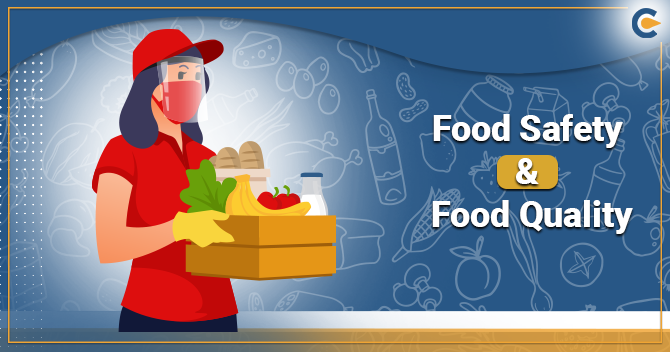FSSAI is established under the Food Safety and Standards (FSS) Act, 2006. In order to carry out the duties and comply with the authority granted by the FSS Act, the Central Government formed the FSSAI. The regulatory body responsible for carrying out the FSS Act is FSSAI.
The Food Safety and Standards Authority of India is known by its full name, FSSAI. The FSSAI is in charge of the FSS Act as well as its rules and regulations. It verifies that FBOs are using safe manufacture, handling, and storage procedures for food. Additionally, it guarantees that the FBOs adhere to the rules and dietary guidelines outlined in the FSS Act. It examines the FBOs’ food facilities and issues the FSSAI license, which is necessary to operate a food company.
Why is an FSSAI License required?
The main role of FSSAI is legal compliance. All food enterprises, including producers, merchants, and restaurants, are required by law to get an FSSAI license. Therefore, food enterprises can avoid legal action and penalties for non-compliance by getting a license.
A food business may show customers that it is dedicated to food safety and quality by getting a food license. Customers are more inclined to select a food establishment with an FSSAI license as they become more conscious of the quality of food safety. This can assist food enterprises in gaining the patronage and confidence of their clients.
Furthermore, food businesses can boost their brand recognition by securing an FSSAI license. An FSSAI license essentially serves as evidence to suppliers, customers, and other interested parties that the food industry upholds standards of quality and safety. As a result, greater revenue and greater customer loyalty might result from a good brand reputation.
A food business’s access to important data and resources about food safety and quality is further enhanced by obtaining an FSSAI license. The FSSAI offers best practices information and updates on a regular basis, which can assist food firms in streamlining their processes and keeping abreast of industry advancements.
Who can apply for an FSSAI license?
FSSAI registration is important for anyone wishing to operate a food company, and they must register the same. Not only does this entail cooking, but it also requires handling food at many points before it is finally consumed by the consumer, such as when it comes to raw materials, manufacturing, processing, messing, canteen packaging, distribution, and the organizations with the power to sell it.
Companies with yearly sales of more than 20 crore are eligible to apply for a central FSSAI license. Importers, manufacturers, central government employees, railroads, airports, seaports, and other qualified food business operators must get a Central FSSAI license from the Food Standards and Safety Authority of India.
Role of FSSAI License
Establishing food safety standards is the primary role of FSSAI. These guidelines, which guarantee food items are safe for ingestion, are founded on scientific data. The FSSAI establishes guidelines covering everything from ingredients and labelling to hygiene and sanitation for many food items, including dairy products, packaged foods, processed foods, and meat and poultry products.
Enforcing food safety laws is one of the main roles of FSSAI. The agency inspects food enterprises to make sure that they abide by the rules and regulations pertaining to food safety. The FSSAI’s responsibility is to take enforcement action, which may involve fines, penalties, or even license revocation if a business is found to be in violation. In order to look into and punish cases involving violations of food safety, the FSSAI also collaborates closely with other governmental agencies, including the police and the health department.
Another role of FSSAI is for industry monitoring. To find patterns and potential risks, the group gathers data on food items and ailments linked to eating. Utilizing this data, policies and initiatives are created to enhance food safety and safeguard customers’ health. The second often-performed role of FSSAI is to educate and train food businesses and consumers about food safety laws and regulations.
Promoting public knowledge of nutrition and food safety is one of the major roles of FSSAI. It carries out a number of campaigns and initiatives to inform the public about safe food preparation, handling, and storage techniques.
Role of FSSAI in promoting public health
The role of FSSAI in promoting public health in the country is the most crucial one. The FSSAI’s primary duty is to prevent food adulteration and contamination. Strict guidelines on ingredients, additives, and labelling are established by the FSSAI License, making it more difficult for dishonest companies to offer contaminated or subpar food items. The food industry’s integrity and public health are preserved in part by this control over adulteration and contamination. The role of FSSAI is to guarantee customers that the food they eat is both safe and of high quality by implementing food safety standards and regulations. This promotes customer trust in the food goods on the market and improves consumer safety.
The most common role of FSSAI is monitoring. Strict rules and monitoring programs implemented by the FSSAI aid in the prevention of food-borne diseases brought on by chemical risks, microbiological contamination, or other pollutants. The food safety and health of the people are safeguarded by the FSSAI certificate, which guarantees food safety along the whole food supply chain.
Different Initiatives of FSSAI
The business has made a number of efforts in light of how crucial it is to uphold food safety regulations. The following is a list of some of the FSSAI’s most significant initiatives:
- Eat Right India: The FSSAI seeks to guarantee that all Indian citizens have access to high-quality food in addition to providing nourishment to all of them.
- Clean Street Food: The FSSAI sought to educate and teach street food sellers about the FSS Act’s infractions through this program. This also addressed the street food sellers’ social and economic advancement.
- Diet4Life: The goal of this program was to raise awareness of the many kinds of metabolic problems and how to prevent them.
- Save Food, Share Food, Share Joy: As part of this campaign, FSSAI encouraged individuals to avoid wasting food and encouraged food donations. In order to improve food accessibility for the underprivileged also entailed establishing connections between food-producing and food-collection organizations.
Non-Compliance with FSSAI Regulations
If food businesses are discovered to be functioning without a valid FSSAI License or in breach of food safety rules, the FSSAI has the right to levy fines. Depending on how serious the non-compliance was, the sanctions might include everything from fines to the temporary or permanent closure of the company. Penalties act as a deterrent and motivate companies to put food safety and cleanliness first.
FSSAI License with Corpbiz
From this blog, we are now fully aware of the main role of FSSAI and how important it is. The protection of consumers is the major role of FSSAI in India. With Corpbiz, you can get a seamless FSSAI license registration and other services and aid in the role of FSSAI.
Frequently Asked Questions
What are the consequences of violating FSSAI regulations?
Businesses that breach the established requirements may have their licenses and registrations suspended or cancelled by the FSSAI. Penalties for non-compliance might include fines and/or jail time.
How can customers report food establishments that are not in compliance?
Customers can lodge complaints against non-compliant food enterprises through the FSSAI's online complaint site or by getting in touch with the closest FSSAI office.
How long does it take to issue an FSSAI license?
The Licensing Authority must provide a license to an applicant within sixty days of the applicant submitting a completed application.
When is the renewal of an FSSAI license denied?
Renewing may be refused if previous inspections revealed significant violations of standards, hygienic practices, or safety requirements. Give evidence of the corrections made and the ongoing compliance.
What distinguishes a central FSSAI license from a state license?
The state FSSAI license is only valid inside the boundaries of the state that issued it, and it must strictly abide by state laws. On the other hand, the central FSSAI license is valid across the country and covers both state and central regulatory frameworks.
In India, how many different kinds of FSSAI licenses are there?
The basic, central, and state licenses are the three primary types of FSSAI licenses.
Does a food business need to obtain an FSSAI license in order to operate?
Yes, an FSSAI license is required for a food company.
What is FSSAI?
The Food Safety and Standards Authority of India, or FSSAI for short, is a statutory organization under the Ministry of Health and Family Welfare of the Government of India that oversees and regulates food safety and standards in the country.
What is the role of FSSAI?
FSSAI's primary duty is to establish science-based guidelines for food items and control their production, storage, sale, and import in order to guarantee their quality and safety.
Is membership in FSSAI required for all Indian food businesses?
Yes, obtaining a license or registration from the FSSAI and adhering to its requirements is mandatory for all food enterprises, including food producers, distributors, retailers, and food service outlets.
Read Our Article: Importance Of FSSAI Registration For Food Industry











